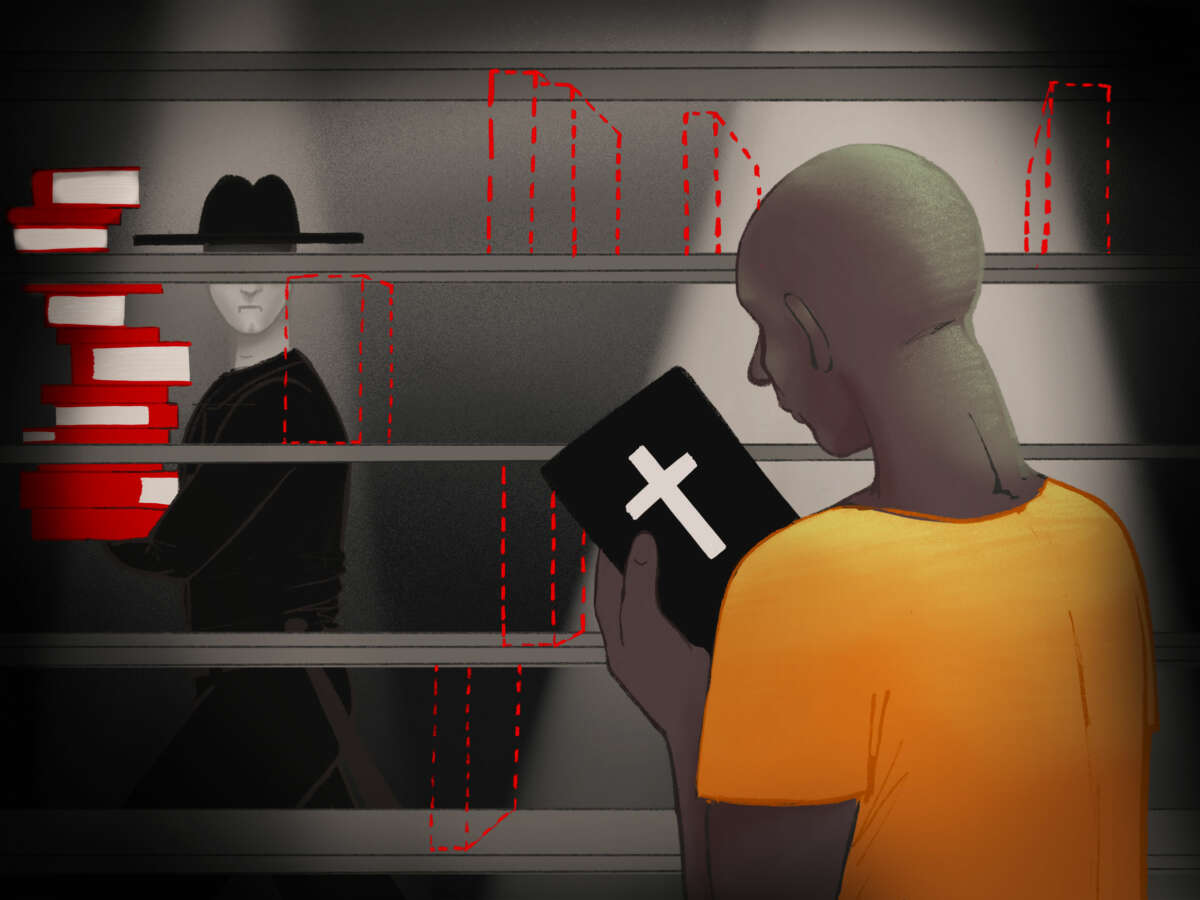Support justice-driven, accurate and transparent news — make a quick donation to Truthout today!
Organized pro-censorship activism has produced double-digit increases in documented censorship attempts in public and school libraries, prompted state and federal legislation aimed at restricting the right to read, and animated the presidential campaign as Ron DeSantis runs on the issue while Joe Biden looks to coordinate a federal response against book bans by naming a “book ban” czar. For anti-carceral activists and librarians working in prisons and jails, efforts by the state to limit access to information are old news.
Incarcerated people are subject to severe forms of censorship that include bans on maps, images or books in foreign languages. In some cases, prison mailrooms simply refuse to distribute reading material at all. “It’s almost like the outside is reproducing what’s been happening for a long time on the inside,” Sarah Ball, a jail services librarian at New York Public Library, told Truthout.
It’s hard to put numbers to book banning in carceral institutions. The Marshall Project maintains an incomplete database of books censored in prisons and jails alongside a list of prison book ban policies. But Ball says these resources likely don’t capture the entirety of the problem. “So much of what happens inside prisons is extralegal,” she said. “Some of the books that are rejected aren’t even sent back. The person who sent it doesn’t know. The person meant to receive it doesn’t know. There is no accountability and no oversight.”
Garrett Felber, an abolitionist organizer with Study and Struggle, a collective that supports radical study groups in prisons, agrees. “It’s just arbitrary and case by case,” he told Truthout. This makes organizing against carceral book bans even harder to do. “How do you fight a form of censorship that’s not about banning titles or lists, it’s just people in mailrooms making arbitrary decisions based on whose mail it is?”
It shouldn’t be this way. In 1962, Muslim activist and educator Martin Sostre was denied access to the Quran while incarcerated at Attica. (At the time, only Bibles were allowed inside.) He filed suit against prison officials, arguing that he had a right to practice freedom of religion. Sostre won. His case laid the groundwork for a decade of litigation that affirmed the First Amendment rights of incarcerated people and spawned dozens of prison book programs. Sostre’s legal precedents should have secured the right to read in prisons and jails.
But that right to read has since been severely restricted, and not just by the capricious elimination of books when they arrive in the mailroom. Stephen Wilson, an abolitionist organizer currently incarcerated in Pennsylvania, told Truthout that the bans extend to many kinds of printed materials. “The policy says we can have internet materials, but the mailrooms continue to deny access to PDFs,” he says. The same content targeted outside is targeted inside. “They don’t want these materials behind the walls,” said Wilson. “The very mention of George Jackson in California prisons is enough to have a gang file opened on a person by prison administrators. Materials that center the experiences of queer and trans people are routinely denied also.”
Awareness and organizing against such restrictions are on the rise. In April, Representatives Emanuel Cleaver II (D-Missouri), Sheila Jackson Lee (D-Texas) and Shontel Brown (D-Ohio) introduced the Prison Libraries Act, a bill that would authorize funding for expanded prison libraries. In June, the American Library Association (ALA) affirmed revised Standards for Library Services for the Incarcerated or Detained. San Francisco Public Library’s Jail and Reentry Services team and ALA received $2 million in Mellon Foundation funds to support that revision process, as well as data collection and mapping of prison library services nationwide. The problem of carceral censorship is on the agenda.
Wilson cautions that these efforts risk expanding the power of wardens and other prison officials to make decisions about what people can read. More funding for prison libraries means more funding for prisons, expanding rather than shrinking the system, a familiar organizing tension. Because of the walls incarceration builds between people on the inside and outside, Wilson argues that “the prison itself is censorship.” The freedom to read for everyone requires an end to the prison.
A terrifying moment. We appeal for your support.
In the last weeks, we have witnessed an authoritarian assault on communities in Minnesota and across the nation.
The need for truthful, grassroots reporting is urgent at this cataclysmic historical moment. Yet, Trump-aligned billionaires and other allies have taken over many legacy media outlets — the culmination of a decades-long campaign to place control of the narrative into the hands of the political right.
We refuse to let Trump’s blatant propaganda machine go unchecked. Untethered to corporate ownership or advertisers, Truthout remains fearless in our reporting and our determination to use journalism as a tool for justice.
But we need your help just to fund our basic expenses. Over 80 percent of Truthout’s funding comes from small individual donations from our community of readers, and over a third of our total budget is supported by recurring monthly donors.
Truthout has launched a fundraiser, and we have a goal to add 182 new monthly donors in the next 24 hours. Whether you can make a small monthly donation or a larger one-time gift, Truthout only works with your support.
